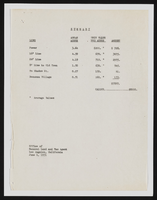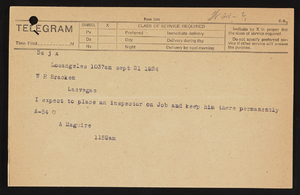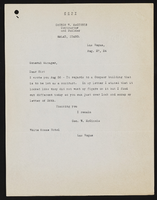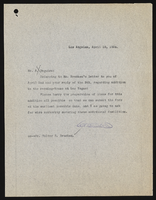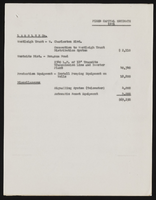Search the Special Collections and Archives Portal
Search Results

Transcript of interview with Arlene Blut by Barbara Tabach, May 28, 2015
Date
Archival Collection
Description
In this interview, Arlene discusses her family and important friendships; her relations with and impressions of the disparate Las Vegas Jewish communities; the meaningful ways her Jewish relationships in Duluth, Winnipeg, and Las Vegas intertwine; her theatrical, professional, and philanthropic work; the reasons she and Jerry became active Zionists; and their support for Israeli causes. Her liberal sprinkling of Yiddish terms enriches her speech as it exemplifies her deep cultural attachment to and identification with her Jewish heritage, despite the fact that her wide and diverse circle of friends remains predominantly non-Jewish.
Actor, director, friend, mother, producer, wife, and volunteer extraordinaire Arlene Piekoff (now Blut) arrived in Las Vegas in 1971 with two young children and husband, Michael Peikoff, who was opening a surgical practice. Arlene was born and raised in Duluth, Minnesota, where she attended a Conservative Jewish temple but had mostly non-Jewish friends. She met Michael at the University of Minnesota, and they married before he began medical school in Winnipeg, Manitoba, Canada. Arlene and Michael followed his residencies and fellowships to California, Michigan, and Manitoba before they came to Las Vegas Through her brother in law and Ayn Rand?s intellectual heir, Leonard Peikoff, Arlene was exposed to Ayn Rand Objectivism, a philosophy that still influences her political outlook. After her 1975 divorce she began working at the Jockey Club; founded the Meadows Playhouse, Las Vegas?s first professional black box theater; and started Renta Yenta, the valley?s first full-service event planning business. In 1980 she married tax attorney Jerry Blut in a Renta-Yenta-produced, Fiddler-on-the-Roof-themed wedding at Paul Anka's Jubilation Restaurant.
Text

Transcript of interview with Bruce Isaacson by Barbara Tabach, March 24, 2017
Date
Archival Collection
Description
Bruce Isaacson was born in 1956 in Castro Valley, California to Betty Griffin and Bernard Isaacson, and spent his childhood in Oakland. He received his bachelor?s degree from Claremont McKenna College with majors in economics as well as drama, and continued studying for his Masters of Business Administration at Dartmouth College. After receiving his MBA, Isaacson started a career in finance, focusing on mergers and acquisitions. In 1995, he moved to Las Vegas to pursue a real estate career alongside his father. In June 2015, Isaacson became Clark Country?s first poet laureate to encourage poetry as an art form in Southern Nevada. Although Isaacson began writing poetry at a young age, he wanted to develop his craft further. So he attended Brooklyn College for a Masters of Fine Arts and studied with famed poet Allen Ginsberg. Isaacson is known in the San Francisco Bay Area as organizer and poet in the Cafe Babar readings in the 1980s. He is also a co-founder of Zeitgeist Press, where he remains publisher and co-editor. In this interview, Isaacson discusses his childhood and how he maneuvered his career path from finance into poetry. He talks about applying for and serving as the county?s first poet laureate, and describes the programing he?s started in this capacity. Isaacson also speaks about his earlier involvement with Bay Area poetry scene as well as the impact of his Jewish upbringing on his life and his art.
Text

Transcript of interview with Emma Ellsworth by Clark Ellsworth, March 5, 1980
Date
Archival Collection
Description
On March 5, 1980, Clark Ellsworth interviewed his grandmother, Emma Ellsworth (born 1902 in Payson, Utah) about her experiences in Southern Nevada. Ellsworth first talks about growing up in Utah and getting married before moving to Pioche, Nevada during the Great Depression. She also talks about bringing up a family in Las Vegas as well as her and her husband’s work in running Beneficial Life, a life insurance business, in Las Vegas. Ellsworth also talks about the Mormon churches in Las Vegas, the schools her children attended, and the number of grandchildren and great-grandchildren she had at the time.
Text

Interview with Sandie A. Medina, January 25, 2004
Date
Archival Collection
Description
Text

